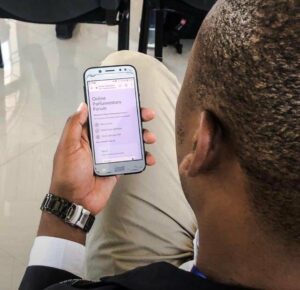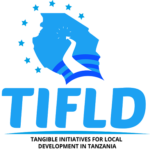Fariha Raisa, Feedback Labs | March 5, 2021
Tangible Initiatives for Local Development Tanzania (TIFLD) is a tech-driven non-profit organization based in Tanzanian in East Africa. As a non-partisan, non-governmental organization, TIFLD strives through its mission is to promote and protect democratic principles by strengthening democratic institutions, mainstreaming the marginalized, and building resilient communities to attain sustainable development through a participatory approach. TIFLD’s strategic plan was developed based on the idea that to facilitate effective democratic governance and the rule of law, one must be prepared to change of practices and mindsets to strengthen democratic institutions. This theory of change inspired TIFLD to design the “Maoni” Forum, which means “opinion” in Swahili.
facilitate effective democratic governance and the rule of law, one must be prepared to change of practices and mindsets to strengthen democratic institutions. This theory of change inspired TIFLD to design the “Maoni” Forum, which means “opinion” in Swahili.
Available on mobile platforms as Bunge Forum, this tool is a new initiative that helps connect Tanzanians with their Members of Parliament through this online format. This citizen-driven Parliamentary Forum (inspired by a bottom-up approach) allows the public to communicate directly to their MPs. The conversations revolve around economic, social, and political-related issues. The tool is a simple and user-friendly interface accessible in both Swahili and English. It is available on the web as well as on apps. The forum requires users to develop an account. Registered users then have access to different features, including direct contact with their MPs and direct contact with other members of the same constituency.
Recently TIFLD came to Feedback Labs’ LabStorm to discuss privacy and safety issues on a public platform, the inclusion of offline communities and motivating the local government to respond to feedback.
Key Takeaways:
Freedom of Feedback.
As people face the threat of prison due to feedback in an open platform, TIFLD sought ideas for ensuring the safety of the users. Attendees proposed an idea for a spectrum of privacy; for instance, something like whistleblowing or anti-corruption measures may necessitate the highest degree of privacy, while reporting public service delivery systems may not. Another suggestion included de-identifying of the data when it is presented to officials. Hence, if they ask for validation, the authority can be referred back to a locality without identifying individuals.
Including communities without internet access.
With TIFLD aiming to reach offline communities outside the platform, attendees recommended gathering feedback by using local leaders to host community meetings at regular intervals. Possibilities of providing an option to citizens to stay anonymous while giving feedback were also discussed. The user voice can be used as evidence for collective feedback, against individual-level feedback. The use of voice-based platforms can be helpful for offline communities, and the platform can play an essential role in validating the information shared by citizens.
Inspiring the local government to feedback.
To motivate the local authorities to respond to feedback, attendees suggested framing the feedback positively. If the local officials respond, it can be posted on social media and publicly commend the officers. Or TIFLD can nominate them to good governance awards. Lastly, it was recommended to reach out to multiple interest groups occupying different positions in the political spectrum. The all-inclusiveness of the platform might encourage many to be a part of it
Following the suggestions from the attendees, TIFLD emphasized working with local communities to reach offline users. They will also attempt an anonymity approach by trying a range of anonymous options to make decisions. They will focus on finding creative ways to help the parliament members access this feedback process, given their busy schedules. Lastly, they will take into consideration the technical challenges to promote the inclusion of offline communities.
If you have a great idea for TIFLD to measure the impact of their program, please reach out to [email protected]!
Learn More the About the Presenter
Geline Fuko is a lawyer, human rights activist and an advocate of the High Court of Tanzania. She is the General Secretary of Tangible Initiatives for Local Development Tanzania (TIFLD), a tech-driven NGO working to promote and for the protection of Democratic Governance and Rule of Law in Tanzania.
Geline holds a Bachelor of Laws (LLB) from The University of Dar es Salaam, earned a Master’s in Comparative Local Development from the Erasmus Mundus Joint Master’s program at The Università di Trento, and holds certificates in Human Rights and Civic Leadership from The University of Strasbourg and William & Mary, respectively. Geline and her team can be reached at [email protected].
Learn More About Tangible Initiatives for Local Development Tanzania
Tangible Initiatives for Local Development Tanzania (TIFILD) is a non-partisan, nonprofit, non-governmental organization dedicated to its mission to contribute to the development of policies and laws that promote democratic principles, strengthen institutions, mainstream the marginalized and build resilient communities. The organization works to promote sustainable development through a participatory approach and innovative tools.
It was established and registered in 2017 by a team of 10 young, talented and passionate leaders and many of the team continue to volunteer their skills, knowledge, experience, talents and interest to the furtherance of the TIFLD vision and mission.
Learn more about Geline Fuko and TIFLD.
Learn More About LabStorms
 LabStorms are collaborative problem-solving sessions designed to help organizations tackle feedback-related challenges or share what’s working well in their practice.
LabStorms are collaborative problem-solving sessions designed to help organizations tackle feedback-related challenges or share what’s working well in their practice.
Presenters leave the experience with honest, actionable feedback and suggestions to improve their feedback processes and tools.
To learn more about participating in a virtual LabStorm, please visit feedbacklabs.org/labstorms. If you are interested in presenting at a future LabStorm, please email [email protected].









